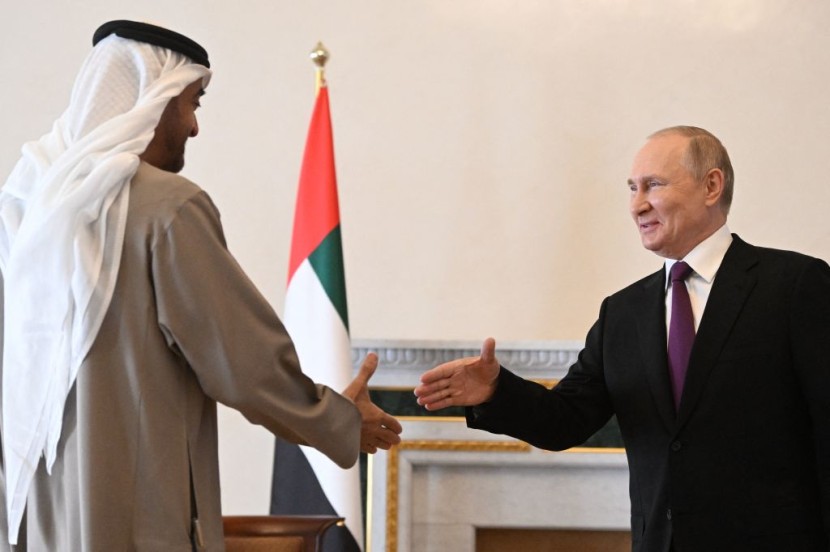
UAE President Mohammed bin Zayed spoke with Russian President Vladimir during his visit and assessed the good relationship between both nations after the Vienna OPEC+ summit. As Moscow said last Tuesday, Al Nahyan stressed that bilateral ties are essential.
UAE Maintains Ties with Russia, West
The UAE's head of state is meeting Putin days after a judgment by OPEC and allied producers, which include Russia, to trim the group's everyday productivity goals by two million barrels, enraging the US, reported the Middle East Eye.
Putin mentioned that last year, the expansion in trade revenue added up to 65 percent well before the conflict in Ukraine, but this year, despite the obstacles, the economy continues to grow not as big as the previous year but still 17 percent, noted TASS.
As reported by the state-run WAM agency, Russian president Putin and the UAE Emirati, known as Mohammed Bin Zayed Al Nahyan or MBZ, will share regional and global issues with "cordial" Russia.
Dmitry Peskov, the Kremlin spokesman, stated that the two heads of state would discuss bilateral issues at the Kremlin in St. Petersburg.
When the Biden administration learned that the Vienna OPEC+ summit would affect an oil cut despite that Washington practically ordered the oil alliance to do its bidding, but was snubbed instead.
The United Arab Emirates and Moscow lowered production to level out the price per barrel. This would be seen as siding with Russia and foiling an attempt to lessen Moscow's profits.
Self-interest Drives UAE's Decisions
Washington, as much as possible, would not highlight its part in the current global insecurity caused by sanctions to hobble Russia's oil and natural gas industry.
Read Also : Bloc Leaders To Discuss Major Issues Including Energy Price Cap, Fallout from Loss of Stability and Security
A statement from Joe Biden published by the White House would show how disappointed the US government is that the oil alliance did not see its way.
As said by Dr. Asif Shuja, a senior research fellow at the Middle East Institute, Biden's trip to Saudi Arabia has increased oil production, notwithstanding his heavily published misgivings regarding the relationship with Saudi Arabia under Crown Prince Salman.
He indicated it was not the Saudi Prince choosing Russia and oil producers in the OPEC. The UAE and the kingdom of Saudi Arabia (KSA) were choosing the best path for their own good.
Another argument presented is that Saudi Arabia's decision has powerful market reasons. The United States seems to have no option but to try to postpone it by incurring additional strategic expenses.
An intriguing viewpoint was offered by Dubai's former finance chief, Nasser al-Shaikh, submitting on Twitter that a UAE representative could go to Moscow for one purpose. It was to avert a European conflict that had exhausted global resources.
The United Arab Emirates, a long-time tactical US partner in the region, has rebuffed Western Russian sanctions and retained partnerships for both sides.
A report in March noted that increasingly desperate affluent Russians were looking to keep their wealth out of the grasp of the sanction regime. Its economic model leans toward political and economic actors.
The UAE Emirati Mohammed Bin Zayed and Russian President Vladimir Putin affirm stakes after the Vienna OPEC+ summit shaking Washington, realizing it failed.
Related Article: Democrats Ponder Ending US Protection in the Middle East To Retaliate for Hostile Oil Cut








